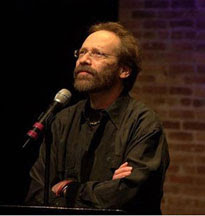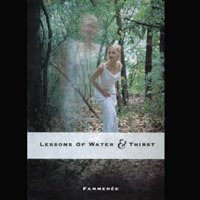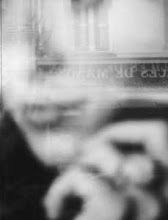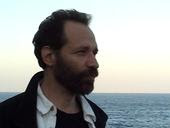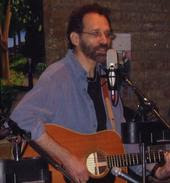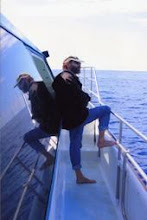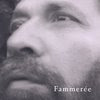 namaste from dear old Blighty. I hope all is particularly relevant for you. I'm enjoying an entire dwelling as my landlord and landlord are blundering about in the Himalayas.
namaste from dear old Blighty. I hope all is particularly relevant for you. I'm enjoying an entire dwelling as my landlord and landlord are blundering about in the Himalayas.
Such luxury should not be wasted.
Valerie wrote of more humanitarian awards. There was another audience with “His Holiness.” She included a photograph of herself tanned and smiling, hanging off the Dalai Lama--the kind of gag photograph tourists create with a digital camera and computer.
It appears she and Byrol are “in correspondence.” Lovely. Akhun left Turkey with Natalie. Another wanker. They’ve traveled on the Continent and are now en route to New Zealand. I imagine them in Thailand, bronzing and blonding, two beautiful--well, at least one beautiful specimen of our tribe.
Received photos from Nilüfer, of all people. There’s a group shot from our first days in Selcuk. We all look as we should, hardy in uncompromising sunlight, though your rugged good looks appear distracted by her hair. She’s asked me to forward it to my friend “the poet.” That’s either you or St. Loup. I assume she meant you. He’s a limp formalist.
She’s penciled Monday
on the back of one and Lily
on another. No dates or explanation on anything else. Peculiar. Like something from antiquity. We find things like that, a single item, one word scratched into its surface. All that survives a civilization.
They’re back in Istanbul. She misses Kas, the harbor at night. I can’t imagine she’d miss that bloody club. Too bad I had only a fortnight. Cyn and I were happy there. You appeared happy, too. You must have been. How long did you hang on there--two months? Now that Meriç is dead, I imagine they’ll leave the capital. Cyn informed me that Nilüfer’s mother died, as well, this year. She must be having a rough time of it.
There’s a photo of the baby. He looks just like Byrol--with hair. I’ll soon be off again--Zambia, Malawi, Zimbabwe, Madagascar, Mauritius and Reunion. If you want postcards--and the photo--I’ll need more than an e-mail address or does your celebrity status preclude this?
Take care and let me know when you intend travelling to Hindustan. We could meet again in the madness. Don't dirty in church, Skoog.
5 February ‘94
The Conversion of the MonotheistFourteen years before, I dreamt,
I am springing.
Leaves bathe me and flail me. I rip
at their fingers for food. I am cunning. I am
running twice
as fast, and my eyes are twice as large, and
the arrow is my nose. Approaching Ancient SmyrnaGreen
house, blue house, sky-blue horse
neighing the earth emerald, nibbling
emeralds.
Red painted over
red fingernails clawing a peach perfectly
bitten to its veined seed. Undulating
bellies are velvety for more
seeds, ready to birth more olive
tongues and more seeds excited into sight
by a fist of citrus sun.
The under bellies of my fists
press their branches to cold glass
mirroring bird-embroidered
trees whose leaves are tongues
for the wind and fins invoking
wet.
Resting, resisting and not resistingI am weary of stones
and their hard stories and the earth
sponging up so much writhing and trees
sponging up so much writhing and so much
winter.
I want the morning to taste of beginning. I
have come to Lydia to taste
beginning. Blood orange, blinding
yolk, the one eye plumbs even my lemon
stomach for something to ripen.
Open me. I need to be bled of fear and anger which
were fed to me before I could chew.I have not slept since Istanbul, and
weariness amplifies the sensation of being
myself and another descending
four sinking steps.
Behind a facade of souring
bricks, a field is sinking,
blinking. Leviathan slumber, purpling,
anticipating the next flood.
Trees root into their backs and into
the sky (as we do, bleeding,
leafing).
Fruit ripens to rot if it touches the earth
before it is eaten.
I taste blood among the sacrifices.
Here is
a goddess who has eluded Christians,
Vandals and connoisseurs.
Here are her lips, but they are
petrified. What horrors has this Daphne
fled? Could my seed warm her and worm
her open, or would I dry upon her,
irrelevant?
I kneel to her
ankles, to unbraid her.
Animals drink here.
Another man may drink here.
Many lips may be necessary for the busy
chemistry of life which clouds
and quivers this fugitive
womb, sapphiring, firing.
There is no evidence of a single male god in all
the mud.
An engine and its horn blare.
In the vast temple of birds
not bothered, this shofar is my signal
to return.
The bus is churning and stinking.
The driver beats stagnant air
with the paddle of his free hand; but I do not
hurry.
My bag is still tied to the roof next to a crate
rattling and screeching.
Passengers curl embryonically. A soldier
kneels into sleep, his forehead pressed
to the seat next to mine. Uniform thin, wrist
flat, the wrist of his rifle turning; I dare not
disturb his severe devotions.
The woman who ate the peach turns to my
agility, offering a succulent seam.
The seed drops to the floor.
As I begin to sleep, fish confide in me.
Their gilding is a hoard of lemon spurs and
finch and a fiercer, unnamed yellow, purer,
more potent than gold.
A white horse circles a tree. Her infested tail
swishes and swishes. It prevents bees and
me from approaching.
White horse, lie down and rest
No loss shadows your soul
You are not defeated by a wall of flat leaves
You are not defeated by that which is not seen
I ride you into sleep
Your dreams are not troubled
You do not fear sleep (as we do, entangled
or alone along a ticking perimeter)
You awaken to beginning in your white coat
of copper light
I want to awaken to beginning in a coat
of lightMy head rattles against glass.
The three of
kine.
A whistling wolf eats one of three standing.
My head rattles a thousand times,
and a thousand hands beckon
from a palace wall. Each assumes a glove
of leaf septembering. Children shuffle
below, avoiding more
instruction, ignoring premonitions
and ravens.
What happens to hands of the dead? a school of flies debate.
What will happen to these hands
and their harmonies?
My grandmother reaches for me as she did
when her kitchen was warm
-- But I have not
yet almost died and learned to walk
without a bearded god.
I have not yet loved and parted from all
the characters in my story.
Some have not been born.
My only child has not been born, and I have not yet
recognized her mother. Ephesis and above Ephesis Selçuk, midday, mid August, is very
flat. It is a mirage without filtered water
or weeping fruit.
A man waves a tarnished key at my thirst, "Visit here, visit Ephesis, then, go to a place near the sea like Bodrum."
His museum is a nunnery of thighs, insteps, eyes, digits, breasts, dozens of toy Cybeles, a nipple of Aphrodite. They whisper me through a vestry of combs, pins, tear glasses and blind mirrors to the complete goddess.
When the guard finally turns back to his gate, I approach the perfection.
I am ready, my fingers promise the mysterious decorations veiling and alluring me to the adytum of birth.
"It's a copy. The equivalent of a photograph. Those would have been actual testicles. Skoog, Oxford." His hand, which is stained, does not stain mine. "The original statue would have been much larger and adorned with jewels and sacrificial body parts," he gods with a fountain pen.
"Artist?"
"Of sorts."
"May I?"
"If you like, but anything in this mausoleum will prove more inspiring and informative. Still, if you like. . . . I could bring you to her source."
When the sun is less absolute, Skoog leads me from the cloistral chill of marble and its white exhalations into the red dust of a town suffocating beneath centuries of shuffling.
Beyond a perimeter of carpet shops and reflecting walls dripping bougainvillea, [This blossom fell to its name upon this page, August 18, 1989, Selcuk, Turkey] our shadows point to a rough hole, a dry well adorned with shovels and pick axes.
"In your country this desolation would, no doubt, be a car park." I approach, tethered. A single column protrudes from the earth as a vertebrae. "Christianity has a thorough way of supplanting previous mythologies.”
"
When the first apostles came and struck the painted head from the white breasted body, the impotent rejoiced at this pool."
"Keats?"
"Me. And if one were to follow those trees--"
"Ephesis."
"Imagine walking that emerald nave into dusk and darkness and dawn."
"Processions began here.”
“The first cathedral.”
“The Temple of Artemis. ”
“Really?”
“The seventh wonder of the world.”
“Even Mary's beatification was celebrated here, once Christianity began to gather momentum and pagans. Smoking censers, holy water, just as in the fat days of the virgin huntress."
"Christianity opposes the worship of goddesses--"
"Vehemently. But it’s a shrewd faith. The original multinational. Short term compromise, long term profits."
Far enough above the trees, the distress appears less.
“Let’s not be too severe. Our gods of commerce are destroying far more of the sacred world than those poor buggers could have ever conceived,” Skoog randomly loosens earth with the trowel of his shoe.
"Une palais,” he prods as a weary husband.
“Really?”
“Well, a wooden post stood in this hole and here--" his heal reveals a perfect quadrant worn into stone, probably cut by Skoog himself three thousand years before, nonchalant alchemist-- "a great door swung."
"And here, an azure glass of grapes. And here, a cruet of their blood. I could recline in this chartreuse hollow for centuries--"
"
That was a fire pit."
I recline regardless.
"Too late to ascend. Tomorrow, then." He is dripping.
"Tomorrow, Ephesis."
"Later in the week, perhaps. Where are you staying?" We are amplified by a nesting emptiness.
"I haven't a clue. My bags are at a restaurant."
"I'm sure there's room at the inn. We've a velvety verandah, peaches and yogurt for breakfast and all the characters any writer could devour--”
We pass before a violet wall, white only an hour before, still shedding flakes of blossom, pink and numerous and abandoned as valentines.
"Cynthia is looking for you."
"
Hello, Wencke. This is our psychiatric nurse from Lapland."
"Oslo."
"Where is she?"
Wencke shrugs her hair to one shoulder, glowing. "She was in the shop."
"Your nose is burnt."
"Yours is longer. Enjoy the sunset, boys."
"Your English is superb."
"My English is American. I studied in Berkeley. "
"I learned to perform there, on the street. Do you know Shakespeare & Co.?--"
"Yes, well, I was married to a professor. Shall I tell her anything if I see her, Skoog?"
"Tell her
yes."
"You're so clandestine. If only you were romantic and handsome,
too." She turns, her last words leaping Germanically into a sudden confirmation, conflagration of birds.
"Oh, to be a sip upon that tongue," Skoog drinks from my plastic bottle, umber powdered.
"To Lap nurses."
“Nurses' laps."
This and the rising breeze quivers the sapling in me. Cicada rub more rapidly. Dust rises to my cheeks, leaving its touch along my sleeves. A traveler’s benefice, this serein of shades breathing past me, against me, for dusk is the morning of their half of the day when they walk again for a first time among the flowering grasses of the scrubbed hillside. And now, I suppose, I shall rewalk this day among them, forever searching for a remembrance among abbreviated, impending pillars.
The conversion of the monotheist"Sorry about the kitchen, darling," Skoog coos to Cynthia, leading her by the hand into a depression.
“You should be.”
Akhun darkens, then, scion to generations of money changers, evaluates Cynthia's friend, Natalie, who is also from Perth. Unfortunately, her fetching name is not echoed in her looks or demeanor.
I scratch at a wall with a desultory stick hoping to loosen some fragment of a Saturnian age, at least Roman.
Skoog leads us from ruin to ruin, room by room up the hills. His banter is rehearsal, our camaraderie Chaucerian. My companion is Alexander. He teaches me to sever every Gordian knot. I wish I were breathing all this from the freckles of Wencke’s shoulders and arms.
Higher, still, where flowers are thorned and grass perspires more sweetly, the heat is even more dizzying.
Cyn and I kneel and drink from a well adorned with pilgrims whispering blackly in Portuguese. According to tradition, the mother of Christ expired here.
“Her body is buried somewhere beneath these stones,” whispers Cyn, a little disoriented with revelations, Alice again
in a Wonderland of Catholicism.”
I remain beside her, our shoulders touching by a breath as they had once before a candlelit crèche in a colder century, and we are both pippin cheeked and sleepy with epiphanies. “How many mothers, priestesses, sibyls are buried here?” An adult voice, my voice, startles me as if it were a priest’s higher up, closer to the source of light and dark.
I look directly into the source of shadow. "Skoog, do you realize where you're standing?”
It is the poet again quivering through his chrysalis who would awaken Gaia, Artemis, Mary--each of her--from the domes and thighs of this lost Jerusalem.
“Every goddess of Asia Minor has been excavated or stumbled upon here. The terrain itself is the body of a woman."
He kneels into our reverence, but only for effect, for Cyn, I suspect. A passing radio recalls us to a happier faith,
She would never say where she came from. Yesterday don’t matter when it’s gone. . . and we, the newly chosen, choir in benediction,
Goodbye, Ruby Tuesday, who can hang a name on you-- At dinner Wencke does not smile with me. I’ve waited all day to impress her.
"I'm only sorry that everyone is so surprised.”
"She's a recovering academic
and Norwegian," Skoog reopens an incision.
"Whatever will become of your dead god nailed to a dead tree now?"
“What will become of your immortal soul?”
"What will become of you now that
he has seen this? I suppose, you'll write the paper, Skoog.”
"What
are you eating, Skoog?" Natalie hurries past.
"Tunj, what is this anyway?"
"Has anyone seen Akhun?"
"He was just here."
"Snails," de Saint-Loup raises a metallic face from his plate.
"I'm eating snails."
"Those are bottom feeders."
"Who isn't."
"Tell Akhun I'm staying and taking the gig, will you?"
"The gig. American vernacular is gathering at our gates. I shall never capitulate," de Saint-Loup picks at a silver tooth with a tooth of a fork.
"What are you alliterating about now, Wolfy?" chews Skoog. "Besides, Natalie is not an American--"
"Well, if she were--”
“Well, she is not.” Skoog raises a chipped cup to a chipped tooth,“To our intrepid poet and his lost Jerusalem.” He hesitates. "It would be interesting to know the Dalai Lama's opinion, Valerie--"
"Please, not
that again, Skoog," de Saint-Loup expires.
"It's not for me. It's for Shakespeare here."
"You scoff always."
"Wencke, poets delight in edification. Look at him. I'm sure
you'd like to edify him, wouldn't you?"
"Are you a Buddhist, Valerie?" Hero and husband produce a very Bordeaux bottle. “Michael, the corkscrew.”
"Of course she is. All California girls are Buddhists. The Dalai Lama is a chick magnet."
"Don't be an ass, Skoog."
"I met His Holiness in Darmsala."
"How did you arrange that?"
"I was producing a special for PBS in Boston. He allowed me a question off camera."
"What did you ask?" Hero pours neatly, prepared to forgive life.
"Imagine a world directed by women--presidents, the next Pope, the next Lama--"
Each of us receives half a glass as if it were Valerie’s Bat Mitzvah. Hero’s blouse is creased with disappointments; her profile, pure Picasso.
"
And?" It is good to see a little color in Wencke’s cheeks.
Skoog, sip, sip, sips, saturnine.
"His Holiness said nothing. And, then, 'I've never considered this before.' "
"The most enlightened man in the world, and he's never considered this before-- Even I've thought of that," Skoog glances over the balcony, changes colors and waves a wine glass, brimming with expectations.
"He became emotional--"
“Of course he did.”
"Wencke, come with me tonight to Ephesis. Tunj told me where to find the entrance beneath the fence. The sun rises along the avenue of chariots. We can watch it from the theatre."
Happily preoccupied with the whispering European wine, Tunj nods to no one in particular.
Wencke flushes to the frontier of her Dutch boy blond hair. Her little teeth scamper back. "Are you coming, professor?"
"I've been," Skoog offers Cynthia a persuasion of irregular teeth. “Besides, I’m a bit fatiguée.”
"We could walk the processional way between trees."
Wencke ignores me.
At midnight, without notice, without knocking, she enters my room. Her hair shivers to one side, a perfect wing in timid light, the blush of a manger the night of a birth. A girl emerges from her trunk. They wend to my bed, the moon and Venus reorienting my legs.
"This is Nilfur," Wencke sniffs at my soap and shampoo. "You like beauty."
I concede sleepily.
"I'm not so surprised. Are you Libra?"
I shake my head. Wencke clicks, clicks and a yellow eye of flame resurrects from her fingers and multiplies, converting my cell into a chapel.
Nilfur touches my writing journal. Her fingers are so slender, they tremble in retreat to the nest of her lap.
"Do you write as you travel?" I whisper, heightening the chiaroscuro. “Do you?”each sleepy syllable a pilgrim to the foliage of her hair, thick as fleece blonded by a northern Italian summer.
Two blushing pilgrims, ready stand.
Wencke rises. "Let's go onto the roof. Bring the guitar." The door swings, extinguishes the candles.
Ite, missa est.
We venerate the moon. Laundry is flapping like flags. The pension moves imperceptibly toward the Aegean. We are the night watch.
Wencke says, "So many lights and yet so lost."
I murmur. She clutches the railing.
Nilfur disappears into billowing bodies of bed sheets.
"She'll be fine. She's like that."
"Another caryatid lost.”
Wencke inhales to clear the interruption.
“You know what your problem will be--”
“Tell me.”
“You have so much capacity for love--”
“Capacity.”
“Yes. And you believe all of it even out.”
“All of what.”
“All of you. You lose the most precious each time, don’t you? Happiness requires wholeness.”
Not a sound rose from the vast, waiting altar of earth below us, the oldest earth in the world.
“Wholeness, holiness. It’s the same.”
“Forgive me, but you don’t appear particularly happy.”
“Happiness is not the imperative for me that it is for you. I have learned not to expect.”
“That’s rather sad, Wencke.”
“Perhaps. At least, I am not living any longer a mediocre cinema.”
“Had you?”
“It’s a common deviance. The belief that the sum of trappings can somehow approximate essence. I was in a marriage like that for years. We had French frying pans and a wolf. There are photographs of us on every continent for evidence. But we never touched each other--inside.”
“Do you think Hero is actually her name?”
“It shouldn’t be.”
“Tunj would know.”
“Why is that important to you?”
“She fascinates me.”
“Don’t be a fool. You can see tooth marks on her husband.”
“That’s cruel.”
“Try not to make too much of an ass of yourself.”
“I don’t know what you mean--”
“Oh, yes, you do. Do think the husband is happy.”
“I think she’s not in love with him.”
“Why would she be with him?”
“Why are most people together?--”
“Precisely. But you’re not most people. She desires an elegant life, and she’s waiting until something better comes along. He seems like a nice man, innocuous, funny, even handsome in a predictable sort of way. But he’s not glamorous. That’s his transgression. He’s not glamorous. And so, she’s watching and waiting and spinning. And you want it to be you.”
Her laugh was gilt with brutality.
“Of course, there is a minor complication. She’s pregnant.”
“How do you know?”
”She had no wine, and that was a very expensive bottle. Intended for private consummation, not the likes of you and Skoog.”
“Consumption.”
“A child will create a welcome diversion for a while, but not for long. She will become more dissatisfied than she is now. Remember what I said. Happiness requires wholeness. It is not to be found outside. It is to be cultivated.”
“And what do want, Wencke?”
“I have what I want.”
“And what is that?”
“All anyone can hope to have. Myself. And I’ve found what I came for--"
“Have you?"
"Our pilgrimage is the same, yours and mine.”
“Is it?”My fingers map the nape of her neck.
“A desolate field. All that remains of a temple of a Goddess."
"A hole and a bone."
“. . .
By any other name. I, too, have spent my countless afternoons in Shakespeare & Co.”
The following evening Skoog refuses to stop elucidating. He persuades Wencke again not to follow the unlit, moonlit avenue of trees to Ephesis. They cross a foot bridge in the opposite direction.
Women sit upon stone steps. Children charge from one doorway to another with large eyes and large teeth. Wencke, Nilfur, Cyn and Skoog recline among them beneath a tomb. A perfect frieze, Skoog and his school of women awaiting an explanation.
"These would have been trees and this, a sacred grove,” I join them. “Still,” I circle back, “there is a certain truth in a pillar.”
“And providence in the fall of a sparrow.” This is, after all, Skoog’s proscenium.
Turkish women and girls nod at our engagement. Teeth are gold rimmed or missing, but this does not diminish their appetite. Nilfur translates. There is more nodding. I am surprised that she is Turkish. She tells me, "This village is my home. I am visiting my mother who is ill."
"Where do you live now?" I raise my eyes from her profile carved into stone.
"In another small village. South. Along the sea. Kas."
"Kas?"
"Yes. You should visit. And my name is Nilüfer."
"Nilüfer."
“Yes. It means lily in English.”
I ask Nilüfer to guide me through the quarter, but she prefers to remain among the ruins.
Her back, storied with shadows, a gate, illuminated with shadows, reminds me that I had arrived alone only days before. None of these friends knew me then, not even Skoog. I rise as a prophet in his own country and shake the dust of me from my sandals. Hive after hive is lit from within, three, four generations muffling the clinking of silver to glass with gossip and giggling, unaware that this is the eve of an Exodus and history will change.
The air is crystalline in agreement, tinkling; no wind, only the murmur of primitive electricity and untempered voices. Revelations await me where the cobbled path turns up.
When any woman, prematurely matured by kerchiefs and cardigans, steps out into darkness, it is to hurry--with the cunning of a virgin or a spy--to another house. Children are called repeatedly and herded home. I laugh. The furious mothers may as well be herding cats.
I laugh again, echoing deeper into the labyrinth. A truck appears. It is red and round like red trucks in children's stories. Children scurry indoors. Doors close. Windows close. A mother is shrieking. Shrieking. Suddenly, a mist clouds up, dispersing into a veil, softening stone, making iron less sinister, suggesting a gentler version of the story as mystical occurrences do.
I respire.
The veil resurrects. It billows and swallows from every direction, every corner, ubiquitous as a Semitic god.
A cloud by day, a pillar of fire by night. This is both. Its kiss is chemical. It is a breath that kills. I spring back, but the vapor has done this before. It backs me to a wall, devours my hair and mouth. Something rips. My lips
oh--(How many times will I form my lips into a choking surprise as if reenactment, a small physical incantation, could return me to before that moment/miasma and undo the damage.) But I won't swallow. I won’t. I make my eyes and nostrils smaller and spit out and spit out. I spit out all the way back to the pension.
Tunj and his father assure me, "It's for the mosquitoes." "It's for the mosquitoes." "They have no liver and so they die."
I shower and curse and cry.
Nilüfer regards my fury with pale curiosity. Wencke offers thin lips. There is barely pink between her chin and nose. She rubs her hands together vigorously and palms my eyes. "Keep them closed. Keep your eyes closed and try to relax."
But I won't. I won’t turn into a pillar or tree.Winter and below I have received your words after waiting for many weeks. The last time I talked to you by the telephone, I thought you have a voice that is in a new place now and OK there--a voice I don't remember. It was so far away, as if we don't really know you and me. I don't know how to say this. So I decide that I will not telephone again but this has been very bad time waiting for you to write to me. I check my mail box every day. 2 times every day. And there is nothing, so I come upstairs and try to be happy for the baby, but Byrol too knows there is something very wrong with me now.
He thinks it is my mother's death. And it is, but it is your illness and our separation too. I can not take this. Sometimes I am hoping I never see you again. Never. And then I pour myself a cup of coffee and suddenly cry while I am drinking. I think our love went very deep. Do you think so?
I am so sorry that you have been ill. You seemed so happy in Kas. You were never ill when we were together. We were of one branch, never bruised and like now. What do you mean that you almost died? Is this possible from jaundice? Is this possible in America? Why can't I be with you? How is the world like this?
I am sincerely happy that your friend was so helpful. Is she your girlfriend now?
I sat with my mother as often as I could. Just sit. Sometimes I sang to her. She had a beautiful voice. She became so small with her illness. I wouldn't recognize her. No, I would but it was very, very sad. I imagine you in the bed. It must be terrible for you, my darling. Without the baby coming this would be impossible for me. My mother isin my baby, and you too.
It is better when I imagine you on the hillside and crying together, and the terrible cold chicken picnic we ate. Do you remember? The day we visited the little island.
It was good that we did not make love with our bodies, even though Meriç told me every day to do this with you. She is helping me with this letter. But I was so worried. She thought it was about the baby and told me that it would make the baby easy. I can't explain. I think maybe you understand. But it was a time for our souls to love. The bodies--that is nothing in compare.
We will place flowers on the bed as we promised if ever we see you and me again.
27 Nov. ‘93From the barque of my bed, I explore every rivulet which begins at the cold light and roots to the window above the dressing table. I am yellow as a yolk. It is not pretty, but it is my inheritance, my crest, a shield which does not protect me from without or within.
There is terrible pain beneath my crown. It severs my skull and lower back as if I would open and escape as air from a balloon into air; but I have decided to resume this sack of branches bound into bones and sap fermented into blood.
Someone left a Bible on my bed. I rolled over in my sleep and it dug into my ribs like a stone. Its miracles are dry in my mouth, a catalogue of creation as something without mud, without torment, without tremor. I remember a different Genesis.
I eat from your fingers again and again beneath the thin tree. Its shade is uncertain and uneven and stripes your beautiful wrist, trembling shadows where I kiss and kiss the single blue vein from which anxious, newborn leaves flutter.
The only serpent is time. We believed the laziness of its belly.
And then it strikes, and I am alone suddenly in a cold place without you, and I may never see you again.
I died, Nilüfer. I did. Perhaps, for only a moment, perhaps, longer. My death was half water, half sky, and I floated into its belly, a blue temple, affable, laughable as a bridegroom in a foreign ceremony.
Death held me as if it were saving me from drowning. I smiled to myself reflecting up and floating to me as your legs the afternoon of the silver fish. My hair was thick as your hair. Perhaps, we were brother and sister, possibly twins. Can you feel that?
The blade of my body dropped into a cold mouth gurgling where lungs are made strong and clean. Leaves bathed me and spanked me. I ripped at their fingers for food. I was cunning, suddenly running twice as fast, and my eyes were twice as large and the arrow was my nose.
The sky swallowed. My splashing through echoed wildly. You were not cold upon a gleaming, slippery tongue of stone. You sparkled. Water pulled tangled hair and seaweed along your left leg, and cream was coming from your body.
At your lips I did not hesitate this time.
24 Nov. ‘93
Before I left that night, the last time we saw you and me together, Meriç pushed this into my hand. It was twisted as my heart. She had done that. She becomes very nervous now after the operation. Byrol wanted to see but I held it against me to Istanbul.
I will let you see it. Only you. Meriç wrote this and made this translation for you. I have a good feeling about you together. You will both learn and discover things about yourselves and about each other which will help you in the future. This is a time for making your life. I feel the water goddess around you, protecting you as you journey in. He is a good companion for you. Don't let him dominate your life though. See him for what he is--he has a good spirit and open heart--but put your trust in you, not him. You must be secure + rooted in yourself.
You are already carrying your happiness in your heart.
Keep a mystery. Don't make it too easy for him that he could take advantage of you. You are in search of a lost part of yourself, and your relationship with him is helping you to find and retrieve this.
He has a golden heart for you--I feel he loved you in the past. He still wears his heart for you. Everyone sees this. But put your trust in you. You are similar in this way--he cannot become dependent on you.
And do not attempt to try to control him, because then he will retaliate--even subconsciously toward you. You should know some dark energy tried to interfere with his breathing in the past. He needs to clear this out with good. He needs to heal his relationships around him. Someone put a curse on him. But it did not succeed. However, he carries some upset from that bad relationship. It was a very unhappy, dependent person who would have drown him in her sorrow and grief.
You both have a strong sensuality. I saw it when you were dancing. Integrate this into your spiritual life to release yourselves from the pain and wounds you still carry. Do this together. You can heal each other. Practice a sacred sexual. Start a new life. The old one has not worked. He carries an anger, you carry an anger. Buried. Help each other work it through and let all of that go--
Each day dawns but once.16 Dec. ‘93Upon the 40th day of my illness, I crawled from my metamorphosis to roast a chicken. I carried the heart outside and displayed it upon the snow. Something would eat it.
Without a body to nourish, it was no longer a heart, just a hard little thing upon a numb crust of cold.
Hobbling and sucking a lemon drop (poor little jaundiced eye like mine), I slid recklessly along an icy tunnel of sidewalk delighted with my ripening nose. Abraham, Isaac, Jacob, Esau, Moses, Mohammed, Jesus, the prophets, popes and kings thumped up the barren stairs over my shoulder. We rested at every landing in the stench of another generation boiling onions;
but I am free. I am twenty-eight and I am free. The fever has burned away prejudice, and my prejudices--born of mimicry of fear--were a self imposed periphery. They weren't even mine. I am free to rebuild on this scorched place. I am free to entertain any thought, any deity. No mythology or tradition will ever again dictate my developing mythology. A scab developed on my back. I picked at it and panicked:
skin cancer. But I had not developed skin cancer. My mother had.
She asked that I not visit her after the operation.
She wants me to remember her as my beautiful mother.
Her sisters cautioned,
Don't listen to that nonsense-- She needs to see you-- Mother was adamant--and she also later refused to allow me to carry her up stairs, though father could not do it alone.
When her wig was finally removed, she was not embarrassed before me. The nurse, whose eyes had not quickened during a final, bedside fit of euphoria after the patient had abruptly swallowed a belly of air, taped my mother’s eyes closed. The pastry pink nightgown stained again and crumpled as a napkin.
Here was all that remained of a girl who had studied modern dance and classical piano, taught me to water-color paint and sing harmonies to the English.
Her hair, insignificant as the priest’s, had once been my nest in our sacred hour of the orange cowboy book.
Those were the years before I had been inducted into assigning a name--an ineffable name--and a racial and paternal orientation to the fountain, process and mystery of life. Happily napping, still warm from the egg, counting the random dance of lint in light, her hand pressed to my chest, her belly warming my back, and heaven, which was bluing all around me, did not miniaturize me.
Now, she lay as Ophelia in a pool of deranged blossoms. The flower of a heart is unrelenting. It pushes and pushes until it breaks the vessel of the body, if necessary.
I brushed her fingers surreptitiously with an insufficient blessing of my beard. Here was all that remained of the vessel of my birth, a frail figurine exhumed from a desolation which had once been a sanctuary.
Upon the third day, she was lowered into the earth and became a gilded drum. Dirt thumped and thumped. A man imitating a raven muttered unintelligibly near the shovel, his little, worn book open but not fluttering.
I looked over the workings of the one male god, and left him there to those fascinated or scurrying from a hole in the ground, the womb which had just swallowed the seed of my mother.
Three days after the green, limpid pool Three days after the green pool had reflected broken teeth of pillars and Nilüfer's slim legs dangling without shoes, we entered a great salt wave. Stumbling and sea bludgeoned back to pebbles and sand, we laughed and it felt good to laugh and she found my hand, which said,
I'm coming with you-- She said, "Do you feel? Do you?"
My blessing hesitated. Her skin was as the belly of a fawn. The quieter I became, the more she pressed my hand until it dropped, unhappy stethoscope. She drew my mouth to her neck. "When?" I whispered into the mythology of her tendrils.
"Before you came. No, even before. Before I went to Selcuk."
The seiche of red vines (which are veins) and splintered, thorned branches (bones) shepherded our half sentences.
"Why did you come from there?"
"Wencke."
"Why didn't she come with you?"
"She twisted her ankle at the circumcision party."
"Yes.” Her head dipped and turned as the swan she must have been. “Look.”
A treasury of silver fish clouded the fantasia of our four feet, and we, each half of a godly, lonely ark, prepared to survive our Genesis.
“You stayed with her."
"She had stayed with me when I was ill.”
“After I left.”
“After you left. I brought her meals and we sat together in her room. Sometimes, she read, I wrote. Most often, we were silent. It was very serene. I have happy memories of those mornings.
“There was always a basin at her feet of orange peels floating like feluccas upon the Mediterranean. Their fragrance was delicious. One day, abruptly as a sibyl, she said, 'Go to Kas. You will be happy there.'
“I wasn’t certain I had heard her correctly--she had a towel draped over her head and she was respiring with purpose. I offered the skin from an orange to her foot bath. She pushed my hand, 'Go. You will be happy. I don’t know, I don’t know for how long-- Why should that matter. Even a little happiness-- ’ "
Nilüfer lifted my hand and brought it beneath her chemise. "You didn't recognize me. Do you remember?"
“That’s not true. I couldn’t believe it was you. I didn’t know where to find you. I never thought I would see you again. I only knew the name of this town. And, suddenly, there you were--a myriad of you polishing brandy snifters in a room of mirrors.
“The sky was reflecting and your hair so full and blond, and the wood smoke and tobacco from the night before still so lazy in the air, the miracle burned in my throat. I almost pretended to sleep so that you would come over to my table and awaken me. But
you didn’t recognize me.”
"Yes. But you had been so angry that last time I saw you. The mask of your face was very different--"
"The night that we were poisoned."
"And your hair has grown and you have all this now," she poked at my chin through a beard.
“And your eyes were so sad. We are siblings in that way."
"What do you mean?"
"We offer so much to others, and, yet, we do not--
trust enough?--to receive--or ask. And so, we each carry a sadness adulterous as that cloud."
"I had just come back from my mother."
"To Byrol."
"Yes, to my life here. We weren't happy for a long time. He's nicer to me now."
"Because of the baby--"
"And you. He knows. Valerie, I think, told him.”
“Why would she do that--”
“He says he knows anyway. Don't make such a funny face. You don't understand. He is very different for a Turkish man. Probably because he lived in Germany for so long. Other men
kill their wives for less, much less in these countries."
"He'll use the baby to separate us now." Words became stones in my mouth, and I feared for the safety of my teeth.
"Don't be this sad. Don't be this selfish. It's very difficult for me."
Our knees and fingers mimicked the lingering of a blossom to a leaf, retelling the story, open mouthed and quivering.
“
And when Love speaks, the voice of all the gods make heaven drowsy with the harmony.”
“Did you write that for us?”
A smile she had not seen before. ”Love’s Labor’s Lost.”
"Please let's not be unhappy. Not today. Not now," Nükhet began to climb away from me, away from us with a kiss that tasted of a stomach in turmoil.
Tears clung to her hair, silvering as the sea between templed knees from where deities could view us at their leisure. The light diminished more slowly than is possible. The whimsical old gods must be sentimental.
Whatever or whomever whispered about us, Nilüfer and I held on to each other in an awkward, adorable embrace typical of siblings who are lost or were lost.
She removed her arms from mine and removed this pink scarf from her neck. These tiny shells tinkled uncertainly at the hollow of my throat. I counted them and inhaled her through the teeth of green things.
The scarf does not smell like that now. It does not smell like Nilüfer; and it has begun to fray.
We found Meriç reading close to the water.
The right side of her skull was noticeably convex. She had had a brain tumor removed the previous year, and she had to be careful now. She could not swim or climb. So, she encouraged us and read while she waited.
That day, it was a small green book of fragments. Meriç adored romantic fragments. Meriç adored us.
“May I?”
She smiled, and then, she didn’t.
“Can you translate?”
She shook her head as a child might who has been called upon. “
He seems as fortunate as the gods to me, the man who sits opposite you and listens so closely to your sweet voice and lovely laughter--”
”Who is that, Meriç?”
“Sappho.”
“
Shadowed by roses. And from the shimmering leaves the sleep of enchantment comes down--”
“It's late now," her half face crumpled. Even this curious, pitiful mask was unable to further detain the curtain of night.
She folded something into Sappho and led us to the boatman.
As we bobbed and bobbed back, I promised Nükhet that we would see each other again. “Someday,” I whispered into her hair, and her hair hurried into the wind.
“What? Monday?”
“Yes, Monday--” I called back to her.
“Monday!” And we laughed and laughed.
Monday would be our code for
forever.
Byrol was waiting at the dock in Sabit's van. "Nili, your mother is dying," he said. Nilüfer became thin and cold as a candle and automatically crawled in behind him. Meriç frothed and stumbled after her.
I watched Nilüfer through the exhaust of the van, a soul peering out through a glass darkly, a Persephone peering back at the place where she had been the marriage of sky and earth.
All that remained was a shadow upon the earth, the needle of a compass quivering for direction. Meriç tempted me back to the harbor. She was not allowed to pull. She was crying. Boats were bobbing and ringing as if Nilüfer had not left; but there was no pregnancy in their passion and pushing now, only tedious hammers bereft of chimes. Serpents of light quivered as they had the night Nilüfer interlaced our fingers and pressed them to her lips, blessing them in Turkish; but their glittering was not long upon the book of black water. They became servants of desiccated prophecies, flaming swords turning every way to guard the approach to the tree of life.
And there was no shimmering of leaves without and within as there had been when Nilüfer had walked among us.
One diminishing lamp flashed as a heart, and then did not upon the altar of that night.
She is not departed. She is not departed, my shadow assured me each time it rejoined my body.
"
Worry about her. Byrol is hurt and angry.”
“The human heart is illiterate. It cannot decipher a lapsed contract.”
“Yes, well, that’s all very fine for you in your America.”
We stood too close to the water, disturbed as gargoyles, salt deities ignored since the pale, noisy days of purple banners and earliest lifetimes.
“You have been given a promise. Both of you. It is always a question for people, which they should trust. There are only two--promises of faith and promises of fear,” Meriç limped.
"Prepare the boat of you. Make it clean and warm and ready, Richard.”
Stretched across this bed like a scroll upon an altar, there is only this from the tips of my left to my right: In the beginning we were fashioned from a rib of the tree in the stark place on the little island where we sat together holding each other and crying. The place where I ate from your fingers. The promise of the serpent upon land was ugly and unconvincing. We followed into water where eternity is evident. Our body was our boat, and we rose with the flood. We wore no faces. We had no need. Our souls iridesced as eyes.
Death became a refinement. We slept the fables of its waving forests and migrated its cemeteries.
The particulars of each version of our story do not matter, age nor gender. We are generations of a single promise, more exquisite with each turning. Only your fingers do not change. I know each of your fingers, Nilüfer.
When we separated in Kas, I wanted to return past the flaming sword of myself, turning and turning, guarding the approach to our beginning. Perhaps, I wanted to die--to find you again.
As we promised.
5 January, ‘94This faint stain is blood from her
lip. I wear it when I walk before
the sky.
I have seen her since--crowned in a pink
and burnished tempera; turn
distractedly, smooth
the paper of a package upon her
lap; sleep,
one hand abandoned, one white hand
touching hair from her cheek
The Conversion of the Monotheist [#1]
© 2009 Fammerée
* * * * *
Richard Fammerée
fammeree@att.net
director@universeofpoetry.org
* * * * *
Photograph by Susan Aurinko
* * * * *
















